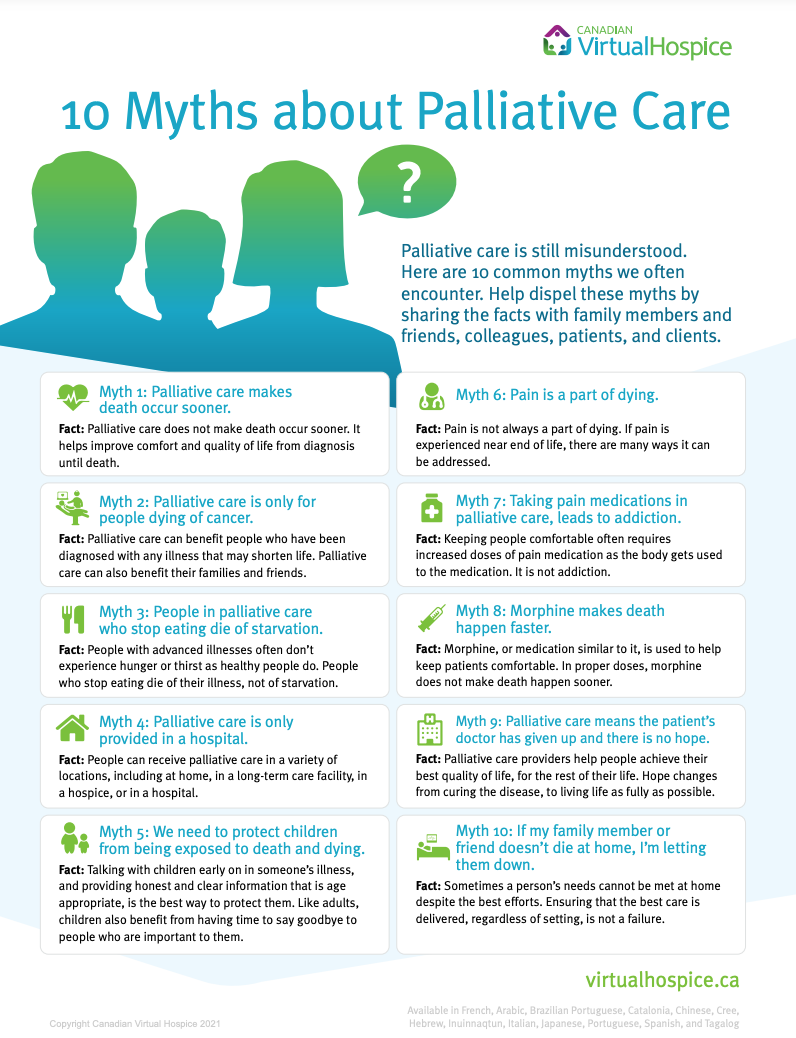National Hospice Palliative Care Week is an opportunity to highlight quality Palliative Care across the country. This week also serves as an opportunity to call for better education and access to Palliative Care for ALL across Canada.
Palliative care is active, collaborative, compassionate and integrated person and family-centred care, for anyone, of any age, facing ANY stage of complex illness.
“Canadians should have access to affordable, culturally safe, high-quality palliative care regardless of where they live and in what setting they choose to receive care. Promoting and supporting the need for improved development and delivery of early, active, competent and compassionate palliative care is essential. This includes expert pain management; skilled psychosocial, emotional and spiritual support; and comfortable living conditions with the appropriate level of care – whether at home, in a hospital, at hospice residences or in any other settings of choice.” Source CCS
To access 10 Myths about Palliative Care, visit Canadian Virtual Hospice
For more information about Palliative Care in Canada, please visit:
The Canadian Hospice Palliative Care Association
Canadian Virtual Hospice
The Canadian Cancer Society
#BustingTheMyths about Hospice Palliative Care
It’s Hospice Palliative Care Week in Canada.
The campaign (May 5th – 11th) this year focuses on #BustingTheMyths about Hospice Palliative Care
This year, the Canadian Hospice Palliative Care Association (CHPCA) designed a “Busting the Myths” campaign as a response to the need to educate Canadians including caregivers, physicians and all healthcare providers, citizens and political leaders around common myths about hospice palliative care.
The #BustingTheMyths campaign aims to empower Canadians through education by identifying and clarifying misperceptions about Hospice Palliative Care in Canada.
Working together to educate one another is a vital step in the pursuit of excellent Hospice PalliativeCare.
Source: CHPCA Canadian Hospice Palliative Care Association
Sign the e-petition to support Bill C-277. An Act providing for the development of a framework on palliative care in Canada
Petition to the Minister of Health
Whereas:
- the 2011 Report from the Parliamentary Committee on Palliative and Compassionate Care outlined the importance of quality palliative care, which must be available to all Canadians in order for there to be a real choice at end of life;
- upwards of 70% of Canadians do not have access to quality palliative care; and
- Canadians deserve to be treated with care and compassion during their last days to live as well as they can for as long they can.
Source: E-petitions. House of Commons
Less than 600 Canadians had signed this online petition as of October 1st.
Please sign the online petition to the Minister of Health is open for signature until November 9, 2016.
Please advocate for a national strategy and universal access to Hospice Palliative Care. Show your support for Bill C-277 to improve access to care for all Canadians.
#Palliative Care is not about #dying, but about quality of #living @JMyersPallCare #hpm
There are a multitude of misconceptions surrounding Palliative Care - what it is and what it isn't. Sadly, many are not open to the prospect of Palliative Care because it presented as a departure from "active care" or moreover they believe that Palliative Care is only provided at end of life. It is in fact so much more than that... I truly appreciate this article demystifying the scope and breadth of Palliative Care written by Dr. Jeff Myers, a Palliative Physician, empathic clinician, extraordinary advocate and educator...
"At a time when assisted dying dominates discussion about end-of-life care, I think it’s important to address public fears around palliative care so that people can use the information to improve their quality of life.
Palliative care is not what happens when all treatments have failed. It does not mean “giving up” or “stopping the fight.” If you are fighting cancer or Lou Gehrig’s disease, palliative care means a team of people — such as doctors, nurses, social workers and others — will help make sure you have what you need to continue fighting.
As a palliative care physician, I am deeply committed to improving end-of-life experiences for people and their families. My focus is not on the disease itself but on the impact it can have, like relieving the severity of symptoms with the overall goal of improving quality of life.
It’s my job to know what matters to you and to make sure you’re not spending time and energy on bothersome symptoms that needlessly wear you down. Pain is a good example: terrible pain from cancer can be exhausting, consume a ton of energy and is worse for the body than any medications aiming to manage the pain. There is no need for a person fighting cancer to also try fighting pain.
There is now very clear evidence that people who receive specialized palliative care actually live longer than those who do not. This is why it’s so important to understand that palliative care is not about giving up — far from it. It’s about living the very best you can for as long as you do."




